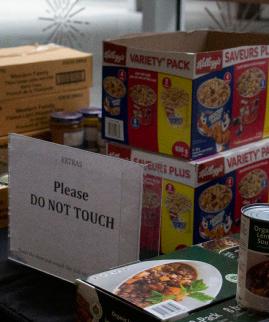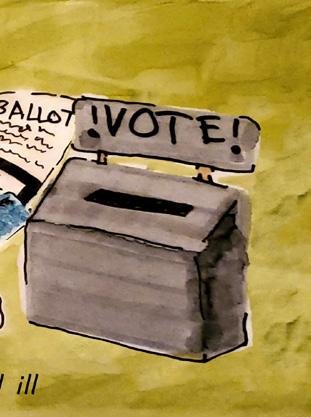Food Habits
Learn how you can have a healthy diet despite COVID-19 restrictions P2

Student Voting
Get our reporter's take on whether student voting will take a hit this election P3

Voice Radio
Our first podcast episode highlights Studio 58's new online format langaravoice.ca

S. Van riding a toss-up

New candidates look to end Liberal's firm grip on the Langara riding
By TYSON BURROWS
For the first time in three decades, the NDP has a chance to wrest away the Liberal stranglehold on the Vancouver-Langara riding.
Since its creation just prior to the 1991 provincial election, the Vancouver-Langara riding has been a Liberal stronghold but could see a shift to John Horgan’s NDP, should the party’s current popularity hold out.
Incumbent MLA Michael Lee, seeking to defend the Liberals’ reign, won in 2017 by the smallest margin since the creation of the riding.
Meanwhile, the NDP’s popularity continues to grow in B.C., partly due to its handling of the pandemic.
Stephen Phillips, coordinator of Langara’s political science department, said the riding tends to vote in groups defined by their demographic.
“There are parts of the riding that habitually vote Liberal and other areas that are fairly staunchly NDP,” Phillips said.
Lee, who did not respond to three interview requests by The Voice, has centred his campaign on maintaining a “healthy, sustainable, and safe community.”
NDP candidate Tesicca Truong is promising a government that will better represent a changing Canada, amid climate change, a seemingly endless opioid crisis and the dearth of affordable housing in the province.
“We need intergenerational leadership to guide us and make sure this province is prepared for a rapidly changing world,” said Truong, who would become the youngest serving MLA in B.C. if elected, as well as the first of Vietnamese descent.
Phillips worried with its current popularity, NDP-leaning voters could become complacent while Liberalleaning voters could be demoralized.
Voters may think “we're going to fail [or] we're going to win anyway, so they don't need my vote,” he said.
Trying to make headway is Green candidate Stephanie Hendy, a champion of equity who is unafraid her opinions might differ from her party’s. Currently a disability case manager, she wants to represent people of lower socioeconomic status, and people with disabilities.
“Let’s help the people that are most disadvantaged first,” Hendy said, “I would like to make tuition free for those who have demonstrated financial need.”
E-ducation disconnects
Transition to online classes has been tough for all involved
By CAROLINE EGAN
Students are struggling to adapt as Langara College has moved to online classes in most programs to help limit contact during the COVID-19 pandemic.
Working all day in front of a computer screen, often at home where others might be distracting and with new, often unfamiliar online tools are common challenges for students.
“It just doesn’t work for me,” said first-year general studies Langara student Kunwarpreet Singh, who finds staring at a screen for too long strains his eyes and trying to keep a “quiet and
focused place” is challenging.
“I would never study at home,” he said. “I now go to Tim Hortons or somewhere to work.”
Singh said that he gets stressed out and loses focus. “It’s definitely a lot harder.”
Langara psychology instructor Deyar
Asmaro is navigating online teaching
this year and has struggled with the quick transition.
“I’m worried about the quality and retention being compromised being delivered online,” he said.
“I feel disconnected.”
Asmaro said that he is more flexible with due dates and tests this year considering the technical and COVID related difficulties that students may be experiencing.
“It would be interesting to see what doors we could open with online learning.”
Another Langara student, Jet Simon, felt differently about learning online.
“It works for me.”
He said that since he is a first-year student in computer science, it is hard to make the comparison to on-campus classes. Simon said that it has not significantly affected his ability to work.
“There’s definitely a lot of pros and cons,” he said. “It’s different for everyone, but I would like to be able to use on campus services.”
ONLINE SPECIAL
LIFE & LIVING
VIEWPOINTS
PRODUCED BY LANGARA JOURNALISM STUDENTS | WWW.LANGARAVOICE.CA
OCTOBER 22, 2020 • VOL. 54 NO. 04 • VANCOUVER, B.C.
Peter Lemanski (left) and Ian Vickers (right) studying from a local independent cafe to access their online learning courses. CAROLINE EGAN PHOTO
“I’m worried about the quality and retention being compromised being delivered online.”
See langaravoice.ca for more coverage
—DEYAR ASMARO, LANGARA PSYCHOLOGY
More recycling bins go missing
South Vancouver residents up in arms against recycling bin disappearances
By CHARLIE CAREY
Agroup of South Vancouver residents is frustrated by the mysterious disappearance of their recycling bins.
Residents have witnessed an increase in bin thefts over the last few years. To combat this aggravating nuisance, they are trying to ward off would-be thieves by patrolling the neighbourhood and marking their bins.
Diane Berard, a Victoria-Fraserview resident, has noticed an increase in thefts over the last three years.
After having her recycling bin stolen and her garbage can tipped out in her laneway, Berard now puts the recycling bins in her garage.

“There’s always people looking around on garbage day, so I put the address on the yellow bag, and nobody’s taken it since.”
Patrick Oliver has become so frustrated he has taken it upon himself to walk around the neighbourhood at 4 a.m. a few times a week as a visible deterrent.

“The only thing I can do is be present. If I do catch someone, I can only tell them to get away,” said Oliver, a
13-year resident of Fraserview near Kent and Victoria, who is also actively reaching out to neighbours to start a block watch. “If you have more than two people it’s safer, right.”
RecycleBC, a not-for-profit organization funded by recycling material producers, runs British Columbia’s recycling program.
The organization has handled curbside recycling in Vancouver since 2014 and offers residents one free replacement bin for every three-year period.

David Lefebvre of RecycleBC “appreciates that it’s frustrating” for residents, and said that if more than
one replacement is needed during this period, residents are “only charged the cost of the bin and delivery fee,” which ranges from $5 to $13.
RecycleBC did not answer questions on how many recycling bins have gone missing.
Marnee Klintworth, a resident who has lived near Memorial Park South for over 20 years, said her recycling bins were stolen just six months after they were installed.
Since marking their bags and boxes, however, Klintworth hasn’t had her bins stolen again.
“First, I started marking with a felt
pen, but slowly over time [the writing] got bigger and bigger. But it was like, why am I having to mark this stuff? It’s just ridiculous. They’re easy to get, and they’ll get delivered to your house.”
Lefebvre said that RecycleBC’s work is to reduce barriers to allow residents to recycle more.
Residents don’t have to use a RecyleBC container, but they should be a similar size to the original blue and grey bins.
To request a new bin, they can call 311 or can use the RecyleBC mobile app.
Surviving a pandemic with good diet
Langara students look to stay healthy during the pandemic
By
Students concerned about healthy eating during the pandemic should stick to the basics, says UBC nutrition professor Gerry Kasten.
Cafeterias, restaurants, and coffee shops across the campus have been shut down since March 21 due to COVID-19 guidelines.
Students who must attend classes in person have limited options for finding
lunches and snacks.
“Good basic nutrition says, eat regularly throughout the day, eat within a couple of hours of getting up, and choose a wide variety of foods.
Most of us could eat more vegetables and fruits,” Kasten said.
“If you’re choosing grains, then whole grains offer more nutrition than refined grains.”
“Before the lockdown, I used to bring my own food anyway,” accounting student Thelma Kawashita said.
“Not much has changed.”
Kawashita prefers to bring food from home if she needs to eat while at the campus.
"I plan meals ahead of time," she said.
When she goes to college, she brings different food items from home, like a pie or a cake to eat during lunch.
However, most students aren’t required to be at the campus the entire day for classes. So cafeterias and restaurants being closed do not seem to affect them much.
For students who are facing a financial hit with the pandemic during the
term, Cristel Moubarak, an instructor in the nutrition and food service management department at Langara, recommended the Community Cupboard, a program that provides a week’s worth of food to students in need.
Moubarak said students should feel no shame in taking advantage of the program. “It’s important to realize that getting good food… and being full is the first step for them to perform well in school.”
Students who are looking to take advantage of the Langara Community Cupboard need only to complete a form on the Langara website, and pick up their grocery bag on campus.
Students who are looking to know more about the program can log onto the Langara website.
HEALTHY EATING TOP TIPS
1. Plan your meals
Eat meals with others. Take time to eat. Notice when you are hungry and when you are full
2. Have variety
Eat a variety of healthy foods each day. Limit highly processed foods.
3. Preparing meals
Use ingredients that have little or no added sodium, sugars or saturated fat.
SOURCE: HTTPS://FOOD-GUIDE.CANADA.CA/EN/
2 Life&living EDITOR SOUBHIK CHAKRABARTI | THURSDAY, OCT. 22, 2020 | THE VOICE
Clockwise: South Vancouver residents are using unique measures to combat recycling bins being stolen.
Top: Patrick Oliver explains how he walks around his neighbourhood early in the mornings, warning would-be thieves of his presence.
Left: A detailed shot of RecycleBC recycling bins.
PHOTOS BY CHARLIE CAREY
“If you're choosing grains, then whole grains offer more nutrition than refined grains.”
GERRY KASTEN, NUTRITION PROFESSOR, UBC
BREANNE DOYLE
Students are experiencing more stress and financial pressures since the beginning of the pandemic. MAX LECKIE

Student voting marked absent
The B.C. provincial government could see a drop in student voting, due to the stress and anxiety surrounding voting during a global pandemic.
A snap election was called in the middle of an academic semester, and amid total uncertainty regarding the COVID-19 pandemic.
For many students, this is the first semester of online learning. The stress of learning in a completely new approach, as well as studying for upcoming midterms could be deter-
rent enough for students to choose not to vote.
Youth apathy for COVID virus creates risk

Young people have developed sentiments of overconfidence against the pandemic.
COVID-19 has been the rise amongst young people in developed countries, and to avoid another major lockdown in B.C. they need to be more careful.

Community steps in after food bank closures
By EMMA GREGORY
Since the start of a petition by the South Vancouver Neighbourhood House, local community members and organizations have stepped in after multiple Greater Vancouver Food Bank locations have closed due to the pandemic. Since creating a petition, the South Vancouver Neighbourhood House (SVNH) has been discussing solutions for the community. This came after seniors and at-risk community members were faced with additional barriers in accessing affordable food in South Vancouver.
The petition started in September and is nearing their goal of 1,000 signatures. Since creating the petition,
OPINION
JACOB VAN LUVEN
Students are also experiencing higher levels of stress. A study from Chegg.org found that 58 percent of college students surveyed were “moderately”, “very” or “extremely” worried about their own mental health.
Seniors need food, solutions
SVNH said they have been in conversation with The City of Vancouver, discussing solutions for food support in South Vancouver.
“We're working on creating a new food hub, that’s where we're at right now,” said Laura Gair, Seniors Hub programmer at South Vancouver Neighbourhood House.
Because of the Food Bank closure, from the end of March, the SVNH distributed meals and one hundred hampers to young families every week. Approximately 300 low-income community members were accessing emergency food every week.

“We need help,” said Gair Location barriers and distribution protocols were two of the main challenges facing community members wanting to access low-income food.
“Before COVID, my place would fit 60-70-sometimes a hundred people. Now with the new restrictions I can only seat maximum 35.” said Reverend Chien of Potter’s Place Mission.
Between Aug. 18 and October,
The same study found that one in five students are experiencing more financial pressure since the start of the pandemic. Financial barriers translate into lower voter turnout, as the B.C. government found that people with a higher unemployment rate and a lower median income are less likely to vote.
The percent of young people voting has risen over the last two provincial elections, but this trend could come to an end due to the constraints of school work and a provincial mandate asking students to stay home. Mail-in balloting is increasing in popularity this elec-
tion but it is still unlikely to draw an increased number of voters, strictly due to the abruptness of this election.
Not all post secondary institutions are providing the U-pass that many students relied on to travel. Many of whom will need to take an increasingly risky transit system. Students are going to have to leave their homes and schoolwork and head to the polls on Oct. 24, 2020. At the same time, everyone is advised to remain in their homes as much as possible due to the COVID-19 restrictions, making going out to vote a difficult proposition.
Issues&ideas
In August SFU Health Sciences professor Scott Lear told Global News: “I think the message that we hear is that you’re young, you´re not going to die, so you´re not going to be at risk”.
HENRI B. NGIMBIS
Dr. Bonnie Henry, B.C.'s health officer, said on Oct. 19 in a statement, "It is possible that we could go into one of those rapidly increasing curves or waves," she said. "We are in a tricky place right now.". Reports from the BC Centre for Disease Control confirm that during the second week of July, the largest proportion of new cases reported was amongst the 20-29 age group.
Since the start of COVID-19 when it first emerged in Wuhan, China, media and medical experts have focused their messages on how the virus mostly affects vulnerable people, particularly the elderly or those with chronic diseases.
With many of the jobs the youth hold closing their doors the lack of employment and other activities during the lockdown is another key factor that explains the rise of the pandemic. Youths, few wearing masks, spend their spare time at social gatherings with a high rate of propagating the disease.
COVID-19 is a serious killer that can damage the lives of all generations of people. Health experts are vehemently warning that the COVID-19 can generate long-term side effects even if somebody recovers from it. With the second wave in full swing, young people in B.C. need to be cautious about how they spend their time. No one wants to tell anyone they can't go out and enjoy their lives. With the risk so high and the potential of another lockdown so great, it’s best if you stay inside. If you must go out, wear a mask.
“I overheard the coordinators talking, and I said I’ll do it.” said Kate Molloy, who works as the executive director of the Kerrisdale-OakridgeMarpole Community Policing Center.
Charlie
Caroline
Norman Galimski
Emma Gregory
Veronika Khvorostukhina
Meg McLachlan
Catherine Mwitta
Henri B. Nguimbis

Jacob Van Luven
We want to hear from you
Have a different point of view?
Tell us.
Have a concern with something we said?
Let us know.
Think we got a fact wrong? Write to us.
Email: ebulman@langara.ca
Viewpoints 3 The Voice
published by
journalism
Editorial opinions are
are independent
student government and administration. We welcome letters to the editor. They may be edited for brevity. Your letter must include
name and phone number. WE WANT TO HEAR FROM YOU Have a news tip? Write to us at thevoice@ langara.ca Journalism instructor Erica Bulman oversees The Voice. Email: ebulman @langara.ca HOW TO REACH US PHONE 604-323-5396 E-MAIL thevoice@langara.ca WEBSITE langaravoice.ca DROP-IN Room A226 Langara College SNAIL MAIL The Voice 100 West 49th Ave. Vancouver, B.C. V5Y 2Z6 INSTRUCTOR Erica Bulman PAGE EDITORS PAGE 1 Rui Yang Xu PAGE 2 Soubhik Chakrabarti PAGE 3 Ryan Ng MANAGING EDITOR Lucas Jornitz WEB EDITOR Safoura Rigi-Ladiz PODCAST EDITOR Jessica Froud REPORTERS Tyson Burrows
is
Langara College’s
department.
those of the staff and
of views of the
your
Carey
Breanne Doyle
Egan
THE VOICE | THURSDAY, OCT. 22, 2020 | EDITOR RYAN NG
ILLUSTRATION
OPINION
Kate Molloy organizes pre-packed grocery bags to be distributed to South Vancouver residents at the St. Augustine Anglican Church in Marpole, Vancouver. EMMA GREGORY PHOTO
SVNH redirected its clients to the Marpole Food Drive and the City Reach Care Society. As a result of the closure of the SVNH, the Marpole Food Drive opened on Sept. 3.













